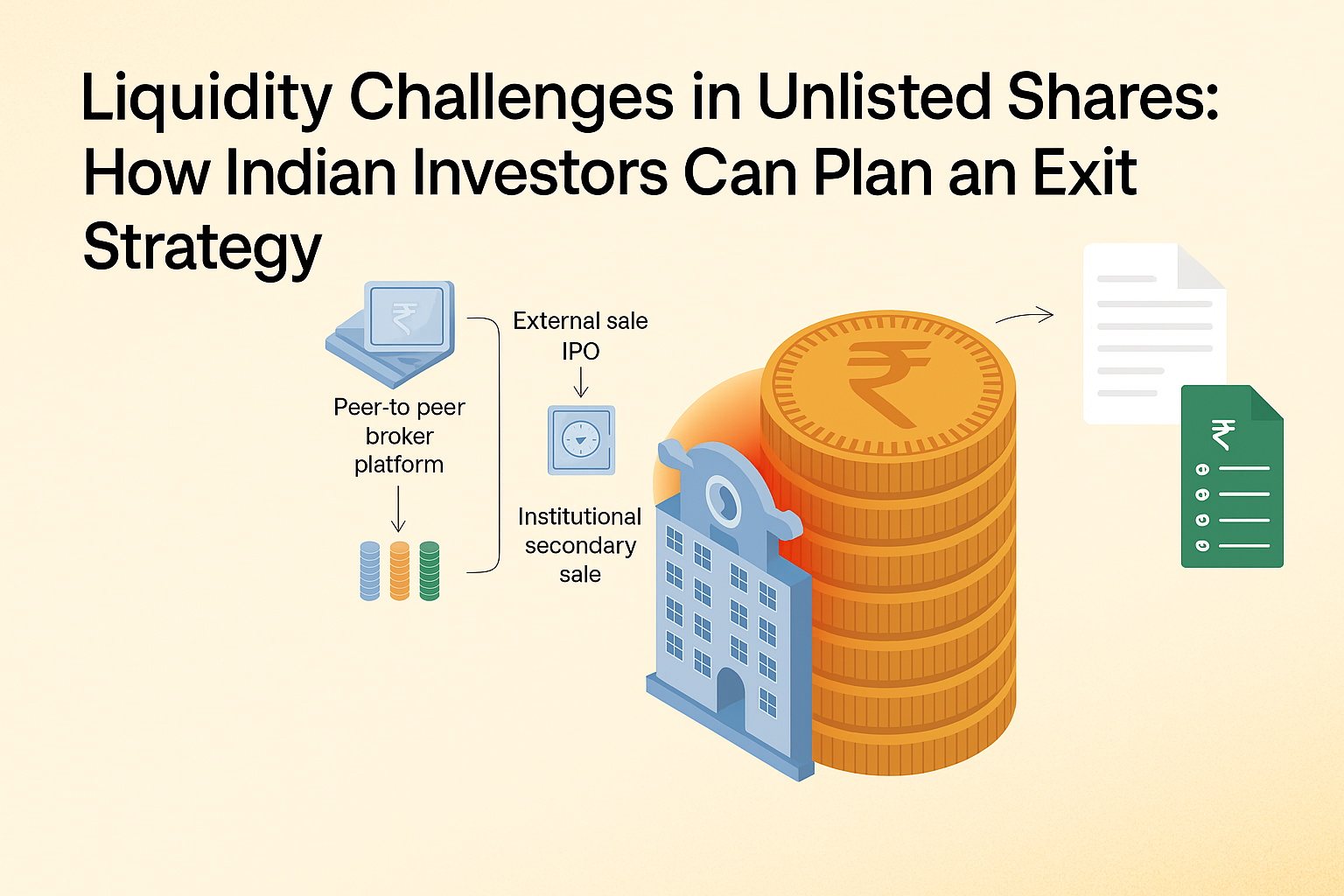Do you hold unlisted shares, perhaps from an exciting startup or a company just waiting for its big IPO moment? Many Indian investors are drawn to the potential of these private market gems. They offer the chance for high returns, often before a company lists on the stock exchange. But there’s a flip side: these investments can be tough to sell when you need to.
We call this ‘liquidity risk.’ Unlike publicly traded shares you can sell with a click, unlisted shares simply don’t have a ready market. Planning how to exit your investment is crucial; it’s not something you should think about only at the last minute. This guide will help you understand these challenges and show you practical ways to plan your exit strategy here in the Indian market.
Understanding the Unlisted Share Liquidity Conundrum in India
What Makes Unlisted Shares Illiquid?
Unlisted shares are stocks of companies not traded on public stock exchanges like NSE or BSE. This lack of a formal marketplace is the main reason for their illiquidity. You can’t just log into your trading account and sell them to anyone. This creates several hurdles for us, the investors.
First, getting market access is tough. You’ve got to find a specific buyer, someone genuinely interested in those shares. Second, information about unlisted companies often isn’t public, making it hard to pinpoint their true value. And third, selling these shares involves specific rules and paperwork that can feel more complex than dealing with listed shares.
The Indian Context: Unique Hurdles for Local Investors
Here in India, our unlisted share market is still finding its feet. We’ve got fewer specialized brokers compared to the huge number handling listed stocks. Investors often need to be super patient; IPO timelines can be pretty unpredictable. This means holding onto your investment for many years is quite common.
Understanding taxation is also key. Capital gains rules for unlisted assets have specific requirements. Proper compliance and documentation are a must for a smooth transfer. These factors make a well-thought-out exit plan even more vital for us Indian investors.
Why Planning an Exit is Crucial, Not Just an Afterthought
Thinking about your exit strategy early? That’s just smart. It’ll help you avoid what we call a “distress sale” picture being forced to sell your shares at a rock-bottom price because you urgently need cash. A solid plan helps you maximize your returns and ensures your investment fits perfectly into your overall financial goals. This approach really helps with better portfolio diversification and management.
Navigating Exit Strategies: Your Options for Selling Unlisted Shares in India
Direct Sale (Peer-to-Peer Transactions)
One way to sell unlisted shares is directly to another investor. This is a peer-to-peer sale. The main advantage here is that you might save on brokerage fees, potentially leading to higher net returns.
However, finding a buyer can be very challenging and time-consuming. You’ll need to network widely, perhaps using private investor groups or trusted referrals. Valuing your shares fairly in such a direct sale can also be difficult since there’s no official market price to guide you.
Leveraging Unlisted Share Brokers & Digital Platforms to Sell Unlisted Shares in India
This is often the most practical route for many investors. Specialized brokers act as intermediaries. They have a network of buyers and sellers and can help you find interested parties. These brokers also assist with negotiations and all the necessary documentation.
New digital marketplaces are also changing the game. These platforms aim to make buying and selling unlisted shares easier, offering wider reach and more efficiency. However, remember that these services come with a cost. You’ll need to pay brokerage fees, which can vary. While these platforms simplify the process, understanding pricing can sometimes still be tricky.
Company Buyback Schemes & ESOP Liquidation Programs
Sometimes, the company itself offers to buy back its shares. This is common in companies with Employee Stock Ownership Plans (ESOPs). If you’re an employee holding ESOPs, the company might facilitate a secondary sale, meaning they arrange for a buyer for your shares.
These company-driven programs can be beneficial. They often provide a fair valuation and a simpler process. But they aren’t always available; they depend on the company’s financial health and its decision to offer such a program. You can’t always rely on them for an exit.
The IPO Route (The Holy Grail, But Not a Guarantee)
The ultimate liquidity event for unlisted shares is often an Initial Public Offering (IPO). When a company goes public, your unlisted shares become listed shares. You can then sell them on the open market, which can potentially lead to significant returns.
Some investors also consider pre-IPO sales. This is where you sell your shares just before the company lists, usually to institutional investors or high-net-worth individuals. However, IPO timelines are uncertain, and market conditions can also affect the company’s decision to go public. This isn’t a guaranteed exit path.
Strategic Sales to Institutional Investors or Venture Funds
If you hold a large block of shares, you might consider selling to another private investor. This could be a Private Equity (PE) firm or a Venture Capital (VC) fund. These firms often look to acquire stakes in promising private companies. Such sales can help you offload a significant investment and even bring in strategic partners for the company.
However, these transactions involve complex negotiations and thorough due diligence. The pool of such buyers is also limited. This route is typically more suited for larger investors.
Key Considerations for a Successful Unlisted Share Exit
Accurate Valuation: Getting Your Price Right
Determining the right price for your unlisted shares is crucial. Unlike listed stocks, there’s no real-time market price. Valuation methods like Discounted Cash Flow (DCF) or Comparable Company Analysis (CCA) are commonly used. DCF looks at future cash flows, while CCA compares your company to similar, publicly traded ones.
It’s often wise to engage a professional valuer. They can provide an independent assessment. Company performance, its sector, and overall market sentiment greatly influence the value. A fair price ensures you don’t leave money on the table.
Legal & Regulatory Compliance in India
Selling unlisted shares involves specific legal steps. The Securities and Exchange Board of India (SEBI) has guidelines for private placements and share transfers. You’ll need to prepare a Share Transfer Deed this is a legal document proving the transfer of ownership. You also need to pay stamp duty on this deed. Form SH-4, a declaration by the transferee, is also required by the company.
Proper due diligence is important for both the buyer and the seller. Make sure all paperwork is correct; this prevents future disputes. For more details on the unlisted share ecosystem, you can explore opportunities in the unlisted market.
Tax Implications: What Indian Investors Need to Know
Understanding the tax on your profits is vital. This is known as Capital Gains Tax. If you sell shares within 24 months of buying them, it’s a Short-Term Capital Gain (STCG). This is taxed at your income slab rate. If you sell after 24 months, it’s a Long-Term Capital Gain (LTCG). LTCG on unlisted shares is taxed at 20% with indexation benefits. Indexation helps reduce your taxable gain by adjusting for inflation.
Securities Transaction Tax (STT) usually isn’t applicable to unlisted share transactions. Always consult a tax advisor; they can help you with tax planning and ensure compliance.
The Importance of Documentation & Record-Keeping
Keep all your documents safe and organized. This includes share certificates or allotment letters, and board resolutions confirming your share allotment. A Demat account is now mandatory for transferring unlisted shares, so ensure your shares are dematerialized before you plan to sell. Good record-keeping makes the selling process smooth and hassle-free.
Timing Your Exit: Patience and Market Signals
Timing plays a big role in getting a good price. Look for company milestones, such as new funding rounds or profitability, as these can increase share value. Pay attention to sector trends and the overall economic climate. Avoid making emotional decisions. Patience is often rewarded in the unlisted market; sometimes, waiting for the right moment can significantly boost your returns. To understand the buying process better, learn more about buying unlisted shares.
Practical Steps: A Checklist for Your Unlisted Share Exit
Here’s a simple checklist to guide your unlisted share exit:
- Assess Your Holdings: Verify the exact number of shares you own, your original purchase price, and the date of purchase.
- Gather Company Information: Collect recent financial reports, business updates, and any news related to the company.
- Obtain a Valuation: Get an independent valuation or research current market prices through platforms.
- Choose Your Exit Route: Decide if you prefer a direct sale, using a broker, or waiting for a company event.
- Identify Potential Buyers/Platforms: Network with other investors or contact specialized unlisted share platforms.
- Negotiate Terms: Discuss the price, payment terms, and other conditions with the potential buyer.
- Complete Legal Formalities: Prepare the Share Transfer Deed, get company board approval, and ensure shares are in demat form.
- Execute Transfer & Receive Funds: Finalize the share transfer and ensure you receive your payment as agreed.
- Address Tax Compliance: Consult your tax advisor and file your income tax returns correctly.
Conclusion
Investing in unlisted shares offers exciting growth potential, but it comes with the unique challenge of liquidity. For Indian investors, understanding these hurdles is the first step towards a successful exit. By planning ahead, exploring various exit strategies, and paying attention to valuation, legal, and tax aspects, you can manage your private market investments effectively.
Don’t let the complexity deter you. Be proactive, stay informed, and exercise patience. When in doubt, consulting with a financial advisor specializing in private equity can provide personalized guidance. This ensures you make the best decisions for your financial future. If you’re also interested in buying unlisted shares, you can understand the unlisted share ecosystem.










